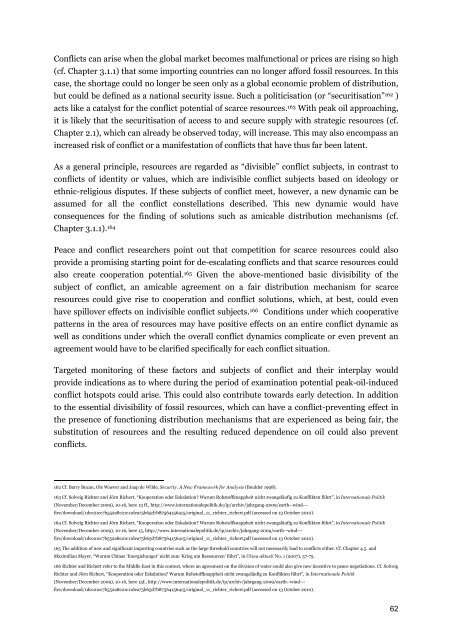PEAK OIL
PEAK OIL
PEAK OIL
You also want an ePaper? Increase the reach of your titles
YUMPU automatically turns print PDFs into web optimized ePapers that Google loves.
Conflicts can arise when the global market becomes malfunctional or prices are rising so high<br />
(cf. Chapter 3.1.1) that some importing countries can no longer afford fossil resources. In this<br />
case, the shortage could no longer be seen only as a global economic problem of distribution,<br />
but could be defined as a national security issue. Such a politicisation (or “securitisation” 162 )<br />
acts like a catalyst for the conflict potential of scarce resources. 163 With peak oil approaching,<br />
it is likely that the securitisation of access to and secure supply with strategic resources (cf.<br />
Chapter 2.1), which can already be observed today, will increase. This may also encompass an<br />
increased risk of conflict or a manifestation of conflicts that have thus far been latent.<br />
As a general principle, resources are regarded as “divisible” conflict subjects, in contrast to<br />
conflicts of identity or values, which are indivisible conflict subjects based on ideology or<br />
ethnic-religious disputes. If these subjects of conflict meet, however, a new dynamic can be<br />
assumed for all the conflict constellations described. This new dynamic would have<br />
consequences for the finding of solutions such as amicable distribution mechanisms (cf.<br />
Chapter 3.1.1). 164<br />
Peace and conflict researchers point out that competition for scarce resources could also<br />
provide a promising starting point for de-escalating conflicts and that scarce resources could<br />
also create cooperation potential. 165 Given the above-mentioned basic divisibility of the<br />
subject of conflict, an amicable agreement on a fair distribution mechanism for scarce<br />
resources could give rise to cooperation and conflict solutions, which, at best, could even<br />
have spillover effects on indivisible conflict subjects. 166 Conditions under which cooperative<br />
patterns in the area of resources may have positive effects on an entire conflict dynamic as<br />
well as conditions under which the overall conflict dynamics complicate or even prevent an<br />
agreement would have to be clarified specifically for each conflict situation.<br />
Targeted monitoring of these factors and subjects of conflict and their interplay would<br />
provide indications as to where during the period of examination potential peak-oil-induced<br />
conflict hotspots could arise. This could also contribute towards early detection. In addition<br />
to the essential divisibility of fossil resources, which can have a conflict-preventing effect in<br />
the presence of functioning distribution mechanisms that are experienced as being fair, the<br />
substitution of resources and the resulting reduced dependence on oil could also prevent<br />
conflicts.<br />
162 Cf. Barry Buzan, Ole Waever and Jaap de Wilde, Security. A New Framework for Analysis (Boulder 1998).<br />
163 Cf. Solveig Richter and Jörn Richert, “Kooperation oder Eskalation? Warum Rohstoffknappheit nicht zwangsläufig zu Konflikten führt”, in Internationale Politik<br />
(November/December 2009), 10-16, here 13 ff., http://www.internationalepolitik.de/ip/archiv/jahrgang-2009/earth--wind-fire/download/1dec21cc7b552a8c21c11dea75b65d7b87564156415/original_11_richter_richert.pdf<br />
(accessed on 13 October 2010).<br />
164 Cf. Solveig Richter and Jörn Richert, “Kooperation oder Eskalation? Warum Rohstoffknappheit nicht zwangsläufig zu Konflikten führt”, in Internationale Politik<br />
(November/December 2009), 10-16, here 15, http://www.internationalepolitik.de/ip/archiv/jahrgang-2009/earth--wind-fire/download/1dec21cc7b552a8c21c11dea75b65d7b87564156415/original_11_richter_richert.pdf<br />
(accessed on 13 October 2010).<br />
165 The addition of new and significant importing countries such as the large threshold countries will not necessarily lead to conflicts either. Cf. Chapter 4.5. and<br />
Maximilian Mayer, “Warum Chinas ‘Energiehunger’ nicht zum ‘Krieg um Ressourcen’ führt”, in China aktuell No. 1 (2007), 57-75.<br />
166 Richter and Richert refer to the Middle East in this context, where an agreement on the division of water could also give new incentive to peace negotiations. Cf. Solveig<br />
Richter and Jörn Richert, “Kooperation oder Eskalation? Warum Rohstoffknappheit nicht zwangsläufig zu Konflikten führt”, in Internationale Politik<br />
(November/December 2009), 10-16, here 15f., http://www.internationalepolitik.de/ip/archiv/jahrgang-2009/earth--wind-fire/download/1dec21cc7b552a8c21c11dea75b65d7b87564156415/original_11_richter_richert.pdf<br />
(accessed on 13 October 2010).<br />
62


